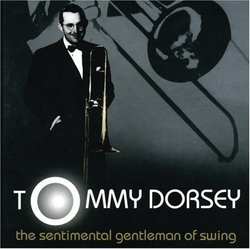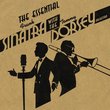| All Artists: Tommy Dorsey Title: Sentimental Gentleman of Swing: Centennial Coll Members Wishing: 2 Total Copies: 0 Label: RCA Original Release Date: 1/1/2005 Re-Release Date: 10/4/2005 Album Type: Box set Genres: Jazz, Pop Styles: Swing Jazz, Easy Listening Number of Discs: 3 SwapaCD Credits: 3 UPC: 828767116723 |
Search - Tommy Dorsey :: Sentimental Gentleman of Swing: Centennial Coll
 | Tommy Dorsey Sentimental Gentleman of Swing: Centennial Coll Genres: Jazz, Pop
|
Larger Image |
CD DetailsSimilar CDs |
CD ReviewsSwingin' overview that forgoes many hits hyperbolium | Earth, USA | 10/23/2005 (4 out of 5 stars) "Although regarded as a giant of the swing era, Dorsey's legacy seems to have a tinge of second banana. As an iconic bandleader, he's often placed a half-notch below Benny Goodman or Glenn Miller, and as a trombonist he's revered more for his technical consistency than his innovation. These aren't necessarily unfair or inaccurate assessments, but when one considers the totality of his career, rather than just the sort of high-points that jut out as oft-repeated modern-day movie soundtrack icons, it's clear that he sits evenly with the elite of the era. The hallmark of Dorsey's work was his relentless (and at time, violent) passion for perfection - something that shows in the tidiness of his band's arrangements and the clarity and precision with which his instrumentalists play. The flipside is that there's simply not as much passion in his music as others of his era. As a trombonist, Dorsey developed an especially smooth (and, at times, passive) style; it's distinctive, but not as engaging as other instrumentalists of his time. In contrast, his rougher skills on the trumpet, employed early on as a sideman, show a fire that he didn't often bring the bigger horn. Even his trombone showcase, 1947's "Trombonology," is more of an exercise in chops than groundbreaking musical thought. This 3-CD set opens with some of Dorsey's earliest recordings, as a sideman for The Golden Gate Orchestra, Sam Lanin, Paul Whiteman and others. The trombone style he'd ply as a bandleader was already forming in these sessions; even when lending a fat tone to his solo on 1928's "Add a Little Wiggle" his horn remained subservient to the band. Dorsey soon moved on to perform and record with his brother Jimmy, but their earliest hits, such as 1928's "Coquette" and the following year's "Let's Do It (Let's Fall in Love)," are missing, as are a surprising number of his early RCA chart toppers, including "On Treasure Island," "The Music Goes Round and Round" and "Alone". Disc 2 essays Dorsey's years as a bandleader, though without the benefit of many more seminal hit singles. Included are classics such as Irving Berlin's "Marie" and the staccato instrumental "Boogie Woogie," as well as oddities like "The Hawaiian War Chant." Disc 3 collects sixteen radio recordings that show off Dorsey's first-take perfectionism in a live setting. In addition to classic sides from the 1940's war years (variously featuring Sinatra, Connie Haines and The Pied Pipers on vocals), the disc closes with Duke Ellington sitting in (and delivering pre-song shtick with Dorsey) for a 1946 take of "Take the 'A' Train," and Elvis fronting the band in 1956 for "Heartbreak Hotel." The omission of early hits is a surprising choice, and though this set may still paint a balanced musical view of Dorsey's catalog, it's unlikely to match the memories held by fans of his arc of popularity. What's here makes for great listening, it just isn't a complete picture of Dorsey's fame. [©2005 hyperbolium dot com]" Excellent overview of Tommy's work with EXCELLENT remasterin Brian H. Williams | Manteca, CA United States | 07/18/2006 (5 out of 5 stars) "Admitedly, this is the first Tommy Dorsey music I have purchased in a few years. I'm so glad I bought this one. It has OUTSTANDING liner notes and great remastering. It is essentially three sections. His sideman days, bandleading days in the studio, and the live broadcasts. Mix in a few unreleased cuts and some great hits (although the major ones are missing) and you have a great retrospect. I'm glad that the big hits are not here, since we have heard them over and over again. What this set does is help you appreciate the great talent that is Tommy Dorsey. His great ability to find new talent and the mind boggling discipline of his band. If you love Tommy Dorsey, you must buy this set. It is presented and remastered superbly. Now if RCA/BMG would only do this to some of their other jazz greats...." An eclectic overview of one of the great big band leaders! Robert Badgley | London,Ontario,Canada | 07/16/2007 (4 out of 5 stars) "This Centennial Collection of the musical legacy of one of the best big bands ever to grace the stage is a fitting and lasting tribute.It lacks alot of his more famous hits but it is generally a pleasing overview with many musical kicks available and many newly released ones specifically on the third disc.
The first disc deals with Dorsey an up and coming sideman in the mid to late 20s.Then as the early 30s come on he has by now become ensconced with his brother Jimmy in a joint orchestra.This was to last until early 1935 when he walked off the stage after a blow up with his brother.On this disc Tommy plays with some legends of the musical landscape of that era like Bunny Berigan,Mildred Bailey,Red Nichols,Art Jarrett(one of the better vocalists of his day),The Boswell Sisters,Gene Krupa,Bing Crosby,Hoagy Carmichael and many others.While they could have picked some better sides there is certainly no arguing with the talent in these songs. For disc two we now come to Dorsey a solo band leader just starting in 1936,playing through his salad years during the war where he solidified his rep as one of the best ever big band leaders and it ends with recordings with his brother Jimmy in 1955(who he had reunited with in 1953).Many of his hits are included here like "Marie","On the Sunny Side of the Street","Boogie Woogie", and others but they are mixed amongst some rather weaker or certainly different picks.I might recommend to you the CDs "Tommy Dorsey Vol.'s 1 & 2" which are available elsewhere for a better overview of this period.There is surprisingly little Dorsey/Sinatra on this disc also,just one in fact..."Imagination",a hit but not one of their bigger or better collaborations.For a more in depth look at these two men I would recommend the "The Dorsey/Sinatra Years".This period is the richest in the Dorsey cannon so I can understand the "why" but not entirely the results. Disc three is I think the best part of this compilation as 11 of the 21 tunes are newly released,all air checks.One particular stand out,among many,is the release of the Dorsey band on Aug/46 of "Take the 'A' Train" with Duke Ellington at the keyboard.The cut starts out in the usual expected manner of Ellington's own arrangement then goes into a wonderful slower tempo that really sets a great unexpected musical mood.It really grabs you.Also a nice inclusion is Sinatra's last recording with the band before going solo .In fact Disc three makes up for disc two by including alot more of Sinatra cuts and they are worthy inclusions indeed.The disc ends with a song that I think should never have been included with this set,"Heartbreak Hotel" with Dorsey backing newcomer Elvis Presley on his(Dorsey's) show.After the bridge the band is totally out of sync with Presley and it is painful to hear.Dorsey was usually such a perfectionist with his band and his own music but it,unbeknownst to most,belies the fact that Dorsey was no fan of this new music and he was not a man to hold back when something bothered him on or off the stand.Was it deliberate? We'll never know for sure but one thing it is it is VERY painful to the ear. Tommy Dorsey was a man of contradictions but an oppionated one.He could be generous and kind when the mood took him but heaven help you if you got on his bad side.He was a perfectionist as a leader and broached no screw ups.Great drummer Ray McKinley played with the Dorseys in the early 30s and would most commonly shake his head if asked about the Dorseys and recall the terrible fights that more often than not occured.Glenn Miller also was one,as the Dorsey brothers' arranger around this time,that recalled often getting in the middle of many a fight both verbal and physical between them.One occasion when a band member interceded between the brothers during one of their violent confrontations that member was immediately sicked on by both of them! When Tommy left to form his own band it was with a vengeance.He was determined to beat his older brother Jimmy at his own game which he went on to do in spades.Dorsey was a great trombone player and there are many oppinions out there as to who the better or best big band trombonist may have been.I'll just say I think that Dorsey was technically a superior player,one of the best ever.However players like Will Bradley and especially Jack Teagarden score a little higher marks because not only did they have the chops they played with a bit more"umph",or "soul" if you will...in my oppinion. But neither of these men could claim in the long run the success Tommy Dorsey had and this set is now out to prove just that.While it could be better in some areas this Centennial Collection like all the other "Centennial's" out there from BMG/Sony that are mostly two-disc offerings for the likes of Glenn Miller,Fats Waller,Benny Goodman,etc.,they aren't out to give a definitive look with hit after famous hit but give a more eclectic view of their careers.And with that in mind this wonderful three disc set more than succeeds.Technically these sides are marvellously remastered and the sound is top drawer. I would recommend this three disc tribute to the late,great Tommy Dorsey to anyone.Newcomers will be thrilled in its' overall view,sound and Dorseys' mastery of his instrument while veterans will get most of their musical kicks from the newly released numbers of disc three." |

 Track Listings (25) - Disc #1
Track Listings (25) - Disc #1
![Dixie Chicken [MFSL Audiophile Original Master Recording]](https://nationalbookswap.com/cd//m/93/5693/1705693.jpg)
